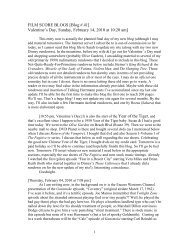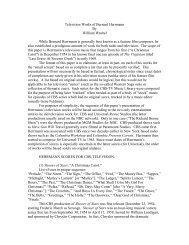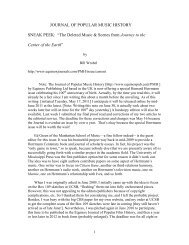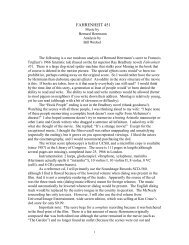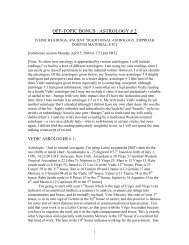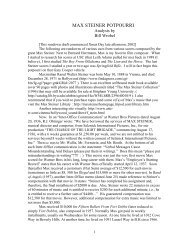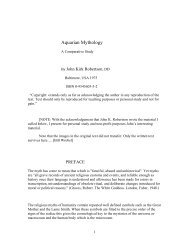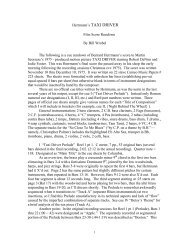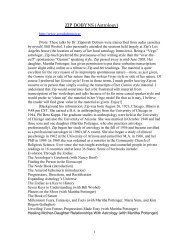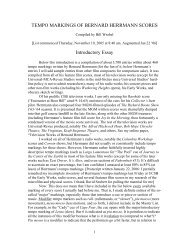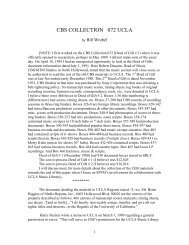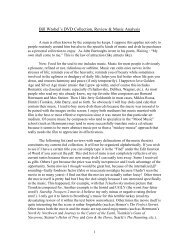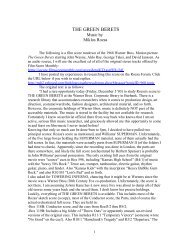Herrmann Music in Have Gun Will Travel and - Film Score Rundowns
Herrmann Music in Have Gun Will Travel and - Film Score Rundowns
Herrmann Music in Have Gun Will Travel and - Film Score Rundowns
Create successful ePaper yourself
Turn your PDF publications into a flip-book with our unique Google optimized e-Paper software.
CBS Library Log Books describe the cue as "Dark, dramatic brass over heavy dramatic<br />
tymp ost<strong>in</strong>ato to tymp rall tail."<br />
-[Next is a repeat M-12 "The Street" Bars 4-8. Dvd location: Chapter 3 from 3:30<br />
to 3:48. Scene: Palad<strong>in</strong>'s back <strong>in</strong> San Francisco, disembark<strong>in</strong>g from a carriage <strong>in</strong> front of<br />
the Carlton.]<br />
-M-37 "End Tag" Moderato <strong>in</strong> 3/4 time, 4 bars, :12. Dvd location: Chapter 3<br />
from 4:31 to 4:39. Scene: As Palad<strong>in</strong> goes up the lobby stairs to a poker game, he<br />
whispers someth<strong>in</strong>g to a woman's ear, <strong>and</strong> they both laugh. Perhaps he said to her, “Do I<br />
have a gun <strong>in</strong> my pocket, or am I just happy to see you?!” The CBS Library Log Books<br />
describe this cue as a "Brass sneak to slow full dramatic tag."<br />
-"Clos<strong>in</strong>g Title" 44 bars, 1:02 [short version :43]. Coma sopra M-11 Bars 1-16,<br />
etc. The cue ends on the D maj (D/F#/A) tonality. CBS Library Log Books describe it as<br />
"Heavy staccato brass groups to full brass curta<strong>in</strong>." Note: This clos<strong>in</strong>g title music is not<br />
<strong>in</strong>cluded <strong>in</strong> the dvd, substituted by the Palad<strong>in</strong> song sung by Johnny Weston. However,<br />
you can hear it <strong>in</strong> the very next episode, “The Outlaw” starr<strong>in</strong>g Charles Bronson.<br />
-Palad<strong>in</strong> Theme [second season to end of series] Johnny Western/Richard<br />
Boone/S. Rolfe. Version A 1:00. "Fast western accompaniment featur<strong>in</strong>g guitar <strong>and</strong><br />
accordion. Slow fade at end."<br />
-Version G. "Relaxed western melody. :26-1:05 Vigorous guitar accompaniment<br />
under s<strong>in</strong>gle l<strong>in</strong>e accordion melody l<strong>in</strong>e."<br />
*****************************************<br />
Now: From here on I will del<strong>in</strong>eate nearly all <strong>Herrmann</strong> music quotations used by<br />
music editors (pr<strong>in</strong>cipally Gene Feldman, credited by the third season); that is, I may not<br />
<strong>in</strong>clude very t<strong>in</strong>y quotations last<strong>in</strong>g only a few seconds, unless I feel motivated.<br />
Remember, <strong>Herrmann</strong> had no <strong>in</strong>put after the pilot show. Gene Feldman (<strong>and</strong> others?)<br />
made the decisions as to where music was to be placed <strong>in</strong> each episode, <strong>and</strong> by which<br />
composer(s), utiliz<strong>in</strong>g the wealth of the CBS <strong>Music</strong> Library. Although I will<br />
overwhelm<strong>in</strong>gly cite locations of Bernard <strong>Herrmann</strong> cues, I will occasionally cite cues<br />
from other composers (especially Rene Garriguenc) who tended to copy <strong>Herrmann</strong>’s<br />
style. This was also <strong>in</strong>tended because <strong>in</strong> a series of cues (“<strong>Have</strong> <strong>Gun</strong> Series” <strong>in</strong> CBS IX<br />
Library), he composed cues partially based on the themes of <strong>Herrmann</strong> composed for<br />
HGWT (basically the famous HGWT fanfare). Fred Ste<strong>in</strong>er also tended to “<strong>Herrmann</strong>ize”<br />
his music style. This is particularly evident <strong>in</strong> several of his <strong>Gun</strong>smoke scores such as<br />
“The Squaw” (airdate November 11, 1961), “Cale” (airdate May 5, 1962), <strong>and</strong> several<br />
others. There are no dvds yet available of these episodes, so I will not del<strong>in</strong>eate on the<br />
music. However, I did discuss the music <strong>in</strong> portions of my <strong>Film</strong> <strong>Score</strong> <strong>Rundowns</strong> cite:<br />
http://www.filmscorerundowns.net/<br />
The Garriguenc cues, therefore, are especially emphasized after the <strong>Herrmann</strong><br />
cues (from the pilot, Police Force cues, etc.) because he was <strong>in</strong>deed commissioned to<br />
adapt the <strong>Herrmann</strong> score or style for the pilot. He went far beyond that of course. The<br />
music is quite good <strong>and</strong> also easily cut <strong>in</strong>to the various episodes. For example, <strong>in</strong> the<br />
Library IX, Reel 58-D-Six” description sheets from CBS, the first cue is # 1035 titled<br />
“Emotional Pathetique” The composers credited are both B. <strong>Herrmann</strong> <strong>and</strong> R. Garriguenc<br />
although Garriguenc actually wrote the entire cue (somewhat adapt<strong>in</strong>g <strong>Herrmann</strong>). The<br />
5




